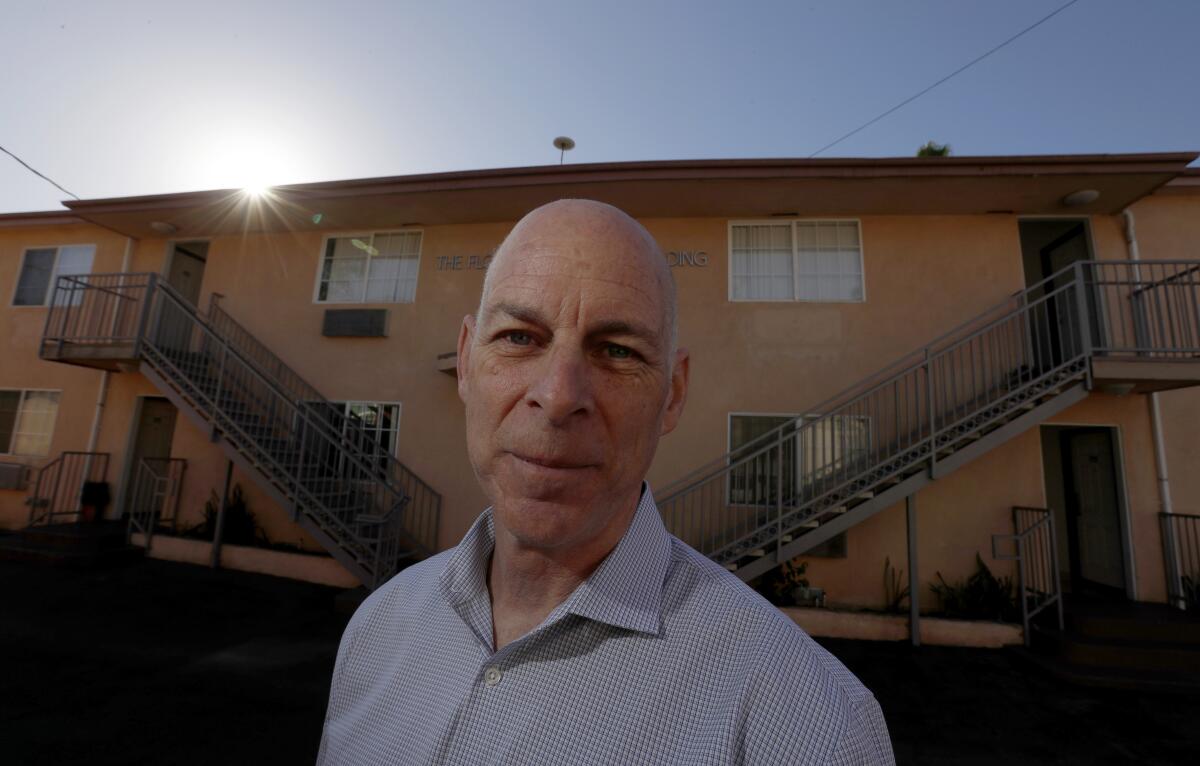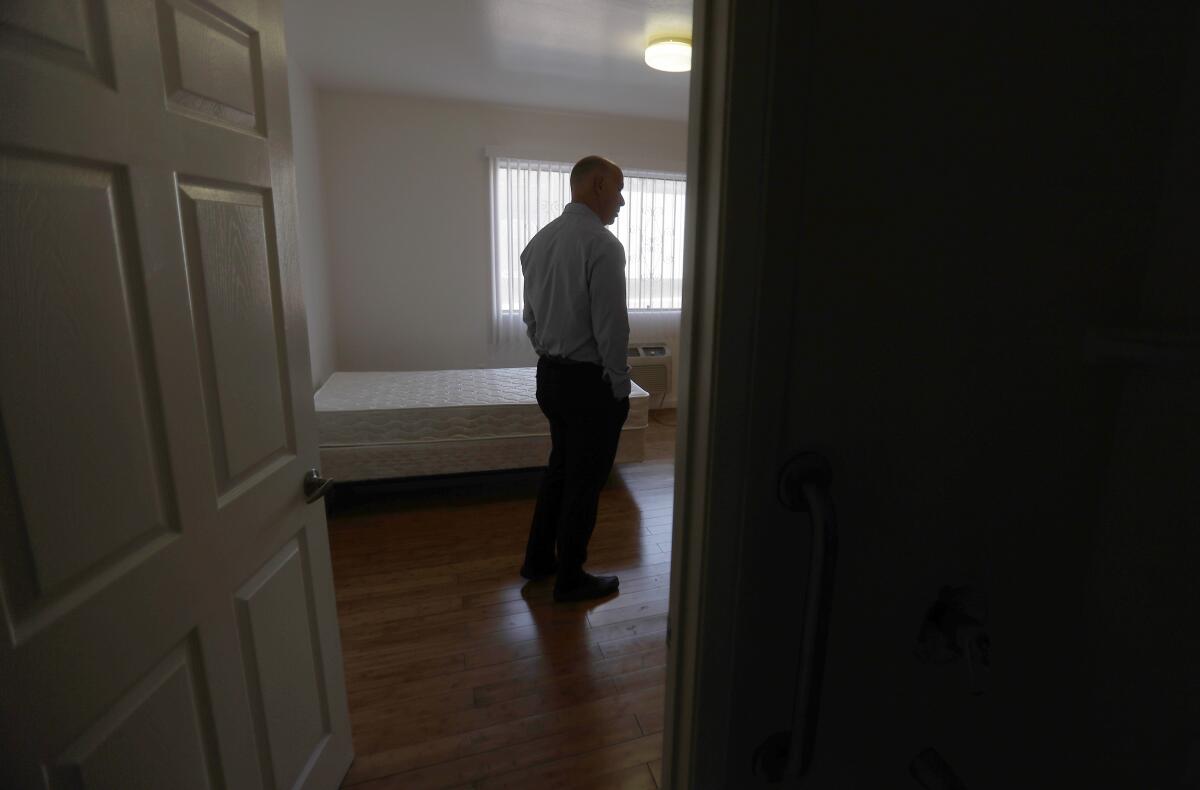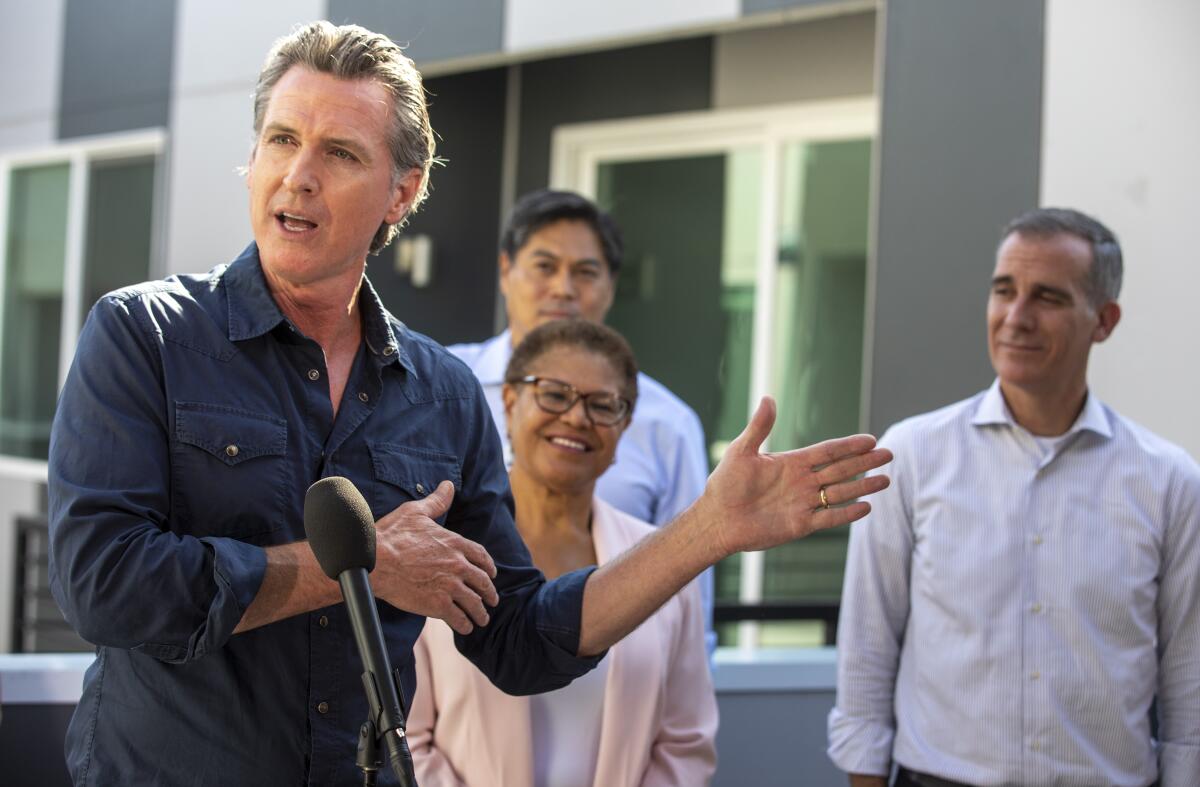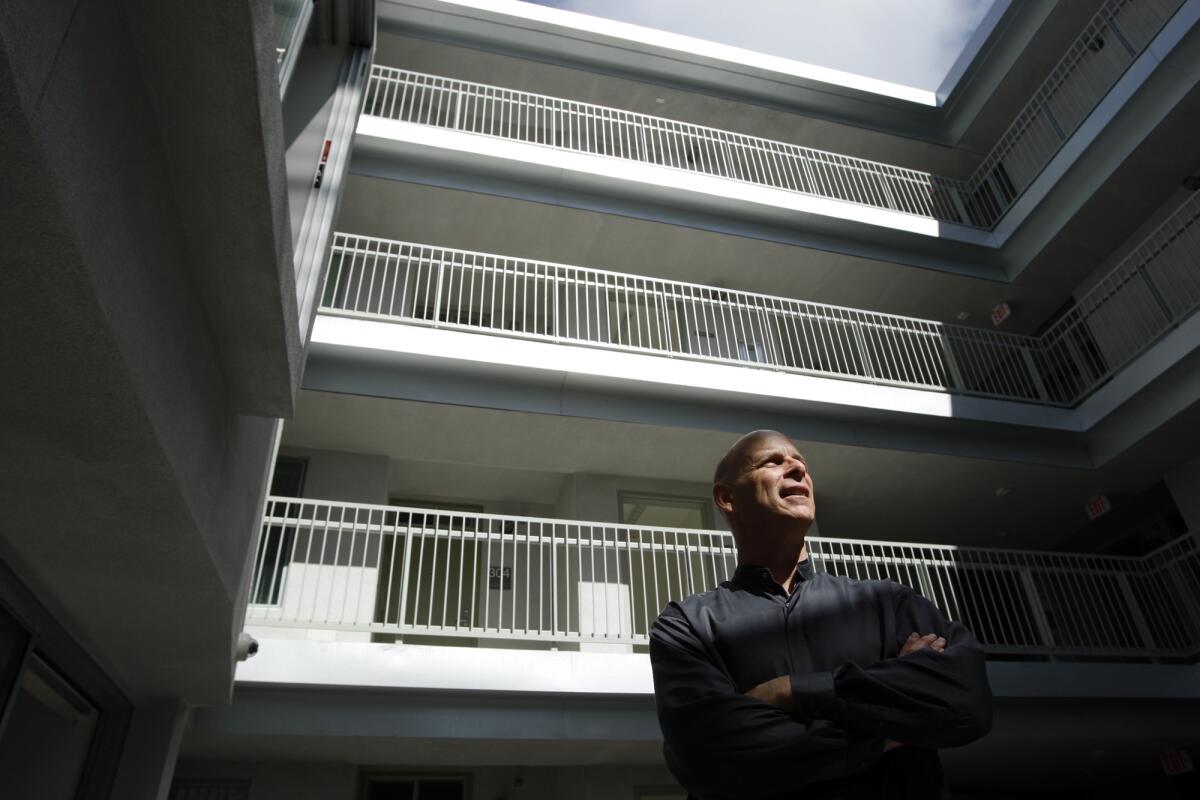Nonprofit helped conceive California’s homeless housing program, then left string of failed projects

- Share via
- Step Up On Second Street was a respected homeless services provider pushing to expand nationally.
- The group helped inspire California’s program to convert old hotels and motels into affordable housing.
- But its seven projects in the state went into foreclosure and the state has sued to get back $114 million in grant money.
One year ago, the Santa Monica-based homeless housing and services nonprofit Step Up on Second Street seemed like it was about to become a national player.
The politically connected organization had helped come up with California Gov. Gavin Newsom’s “Homekey” homeless housing grant program and then, along with its for-profit real estate partner, had become a major recipient of Project Homekey funds.
Together, Step Up and its partner, Shangri-La Industries, pulled in more than $114 million to convert seven California motels into apartments for formerly unhoused tenants. By the summer of 2023, Step Up was ready to take that model nationwide, with similar projects lined up in North Carolina and Denver.
But getting the Homekey grants turned out to be the easy part. While Step Up and its partner lined up business elsewhere, the seven projects in California fell into debt. Instead of creating hundreds of badly needed apartments, the properties went into foreclosure and were taken over by lenders. Four remain empty and unfinished.
“It’s incredibly disappointing,” said Philip Mangano, a longtime figure in national homelessness policy who worked as a consultant for Step Up and previously served on its board of directors. “To me, it’s a failing of national consequence.”
Mangano, who served as a “homelessness czar” for President George W. Bush, helped convince politicians in California and across the country that empty motels could be a cheap, fast solution to homelessness. He also helped Step Up capitalize on that vision, until its real estate partnership with Shangri-La Industries ended in scandal.
In November 2023, Step Up and Shangri-La Industries backed out of a motel conversion in Fayetteville, N.C., telling city officials it was no longer financially feasible, a city spokesperson confirmed.
Less than two months later, in January, California Atty. Gen. Rob Bonta sued both Step Up and Shangri-La Industries in civil court over their Homekey projects, on behalf of the state Department of Housing and Community Development. The complaint alleged fraud and breach of contract, and demanded the return of more than $114 million in grants. In a response filed Sept. 9, attorneys for Step Up denied the allegations and pointed a finger back at state officials for creating the situation, as well as other defendants.
Since then officials in Greensboro, Winston-Salem, Asheville and Wake County, N.C., have scrapped plans for motel conversions with Step Up and Shangri-La Industries, according to Blue Ridge Public Radio. In April, officials with Denver’s Department of Housing Stability also terminated negotiations with Step Up on a hotel conversion.
“I see the next 12 months as a stabilization period for Step Up,” its president and chief executive, Tod Lipka, said in an interview with The Times in May. “And to get past this, because everyone I’ve talked to who has been a partner with Step Up, they know we didn’t do anything wrong.”
Step Up on Second, a homeless housing and services provider, received $2.7 million in future “profit” from the developer of seven state-funded Project Homekey motel conversions, court records say.
Generally, Shangri-La Industries handled acquisition, financing and construction on housing projects, Lipka said, while Step Up provided tenant services and property management at the completed buildings. The foreclosures stemmed from private loans that Shangri-La Industries took out in addition to the state grants.
For example, in Ventura County, Shangri-La Industries received $26.7 million in Homekey funds to convert a 78-room motel in Thousand Oaks, state records show. That was supposed to cover the purchase, renovation and some operating costs. However, according to property records, the company then borrowed more than $10 million for the project from private lenders. It then defaulted on those loans. One of the lenders, Qualfax, foreclosed and took ownership of the property in March.
Today, the former Quality Inn & Suites Thousand Oaks sits vacant and incomplete. It’s unclear when the property will become affordable housing, if ever, or where the $26.7 million in state funds went.
In a lawsuit pending in Los Angeles County Superior Court, Shangri-La Industries has accused its former chief financial officer, Cody Holmes, of embezzling housing money and spending it on personal extravagances, including tickets to the Coachella Valley Music and Arts Festival, jewelry and rent for a Beverly Hills mansion. Holmes, through his attorney, declined to comment.

Lipka told The Times in May that he didn’t know about Shangri-La Industries’ defaults until late last year, only weeks before Bonta hit both companies with a lawsuit.
“In all of our development relationships, we expect our partner to handle the financial side of it,” Lipka said. “And we do expect to get updates, but that’s not our forte.”
Step Up has been a well-respected Los Angeles area nonprofit for decades. But some former insiders who have worked for or with Step Up say that within the coalition-minded homeless housing industry, Lipka has a reputation for doing things his own way.
“I was shocked but not surprised,” said one affordable-housing developer who has partnered with Step Up in the past, about hearing of its involvement in the Homekey scandal.
Founded in 1984 by advocate Susan Dempsay, Step Up started as a scrappy organization based out of a former retail store and warehouse in Santa Monica. In its early days it provided a supportive gathering place for people with mental illness, offering discussion groups, games such as pool and pingpong, cheap clothes for sale and a small library.
The organization opened its first housing development a decade later. In May, Lipka said that after taking over the organization in 2001, he realized that a large number of the organization’s clients were struggling to find affordable housing.
“We had hundreds of people every day coming in who did not have housing and nobody wanted to house them,” he said. However, he became frustrated by the slow and cumbersome process of traditional permanent supportive housing development.
“We started to look at models to scale housing faster and more quickly,” Lipka said. “And part of that was looking at, how do you bring in private investment?”
That quest eventually led Step Up to partner with the for-profit Shangri-La Industries. Based in downtown L.A., Shangri-La Industries is an offshoot of Shangri-La Entertainment, an organization started by the late philanthropist and film producer Stephen Bing.
Shangri-La Industries had worked as a contractor on commercial projects, including upscale hotel renovations. Its then-CEO, Andrew Meyers Abdul-Wahab, said in a 2021 webinar that after meeting Lipka he was drawn to work together, despite having never done affordable housing before, because of a “passion for people” and what he saw as a unique business opportunity.
“We said look, we should approach affordable housing just like the private sector approaches any other apartment building or hotel,” Meyers said in the webinar, which was hosted by the Massachusetts Housing & Shelter Alliance and also included Mangano and Jason Elliott, a high-ranking advisor to Newsom at the time. “We need to design these things cost-effectively, we need to be aggressive with the dollars and cents.”
Before Homekey, Shangri-La Industries and Step Up partnered on other projects including four in Los Angeles using funds from the city’s $1.2-billion Proposition HHH homeless housing bond and completed the projects as promised.
Of those four, two were motel conversions, which turned out to be a fortuitous niche.
Homelessness spending in Los Angeles must more than double to $2 billion a year to end sleeping on the streets in the city, according to a draft report by housing officials

When COVID-19 decimated the tourism industry in 2020, Newsom launched Project Homekey, which gave grants to nonprofits and municipalities to buy hotels or motels and renovate them into homeless housing. Mangano says the idea came directly from a meeting he had arranged between Newsom and Lipka the year before.
“The governor told me that,” said Mangano, who served for a time on an informal homelessness advisory council that Newsom convened. “I’ve known Gavin since he was a supervisor in San Francisco.” A spokesperson for Newsom said he’d look into confirming these statements, but didn’t respond to multiple follow-up inquiries on the matter.
Together, the partnership of Step Up and Shangri-La Industries became one of the top recipients of Homekey, receiving more than $114 million for seven projects in San Bernardino, Monterey and Ventura counties. In application materials sent to the Department of Housing and Community Development, which oversees Homekey, Shangri-La Industries boasted of being a “financial powerhouse.” Meyers even wrote that he could personally commit up to $275 million to ensure the projects’ solvency. Step Up, for its part, wrote that its previous work “was an early genesis” for the entire Homekey program.
Between 2020 and 2023, Step Up grew to 450 employees from 314, according to its tax filings, as annual revenues climbed from about $23 million to $46.7 million. It and Shangri-La Industries began lining up motel conversions in other states, thanks partly to introductions by Mangano.
“Part of the idea was, if we can figure out a way to make this work in North Carolina…anybody in the country would believe that they could do it,” Mangano said. “It would have national implications.”

Lipka told The Times he was driven to expand because he views Step Up’s work as “lifesaving.”
“It’s a moral obligation that we do as much as we can to help people and help communities that ask us to do that,” Lipka said.
According to multiple people who have either worked closely with or for Step Up, Lipka also appeared to enjoy the high-flying lifestyle of Shangri-La Industries executives such as CEO Meyers, a onetime NFL player who sometimes took private jets to out-of-town engagements.
“Tod got high off flying in Andy’s private jet,” said one insider who worked closely with Lipka around that time and still works in the homeless housing sphere. “The organization was overextended, enamored of growth everywhere.”
Sometime after partnering with Shangri-La Industries, Lipka upgraded from a modest car to a Mercedes-AMG, leased by Step Up, according to multiple former employees. Then, to a BMW 8 Series. Some people in the organization said they at the time found the flashiness unseemly for the head of a homelessness nonprofit.
Lipka dismissed that criticism. “I have a car allowance,” he told The Times. “I have a fixed allowance and the organization pays for that, and anything over and above I pay personally for.” His car allowance, he estimated, is about $1,350 per month.
“My focus has always been on the mission, and everything I do is aligned with trying to accomplish that mission,” he said.
Step Up ran into a cash crunch in late 2022 and turned to Shangri-La Industries for an infusion, according to U.S. Bankruptcy Court filings and interviews with a Shangri-La Industries attorney. The Times reported in June that Step Up, at its own request, arranged to sell its share of any future profits from the Homekey projects to Shangri-La Industries for $2.7 million. The company’s attorneys claim in bankruptcy filings that the payments came from funds intended for a housing project in Salinas. Lipka told The Times he didn’t know that and wouldn’t have approved the transaction if he had.
Bankruptcy Court proceedings reveal other payments not previously reported on.
According to an agreement between Shangri-La Industries and Step Up, referenced in court documents and obtained by The Times, Mangano and his Boston-based nonprofit, the American Roundtable to Abolish Homelessness, or ART, would be paid for his advocacy on certain Homekey projects up to a total of $100,000 per property.
When asked exactly what advocacy he provided, Mangano said that the payments were arranged because “I had done a lot of work with Step Up over the years” — for example, helping with board strategy and building up a national profile. “I didn’t really get any money for that,” Mangano said. “Tod said, ‘If I ever come into a situation where I can repay you, I will.’ He cut me into the developer fees.”
A tax filing for the fiscal year ending in December 2022 shows that ART received $226,500 from Step Up. It also shows that Lipka joined ART’s board of directors that year, and received a $149,000 loan from ART for “program service revenue receivables.”
Mangano and Lipka each said in emails that the “loan” was not actually a loan, but rather reflects $149,000 that Step Up still owes Mangano for his earlier work on the Homekey projects. The parties have agreed on payment terms, they said.
In a separate email, Mangano said that any funds received by his organization were understood to come from Step Up’s general revenue or from Shangri-La Industries’ own coffers, not Homekey dollars.
On top of being named as a defendant in that litigation and losing deals in other states, Step Up also saw its outside accountants quit after Bonta filed the state lawsuit, Lipka confirmed. Their departure delayed the organization from filing the annual financial audits required by the Internal Revenue Service for all nonprofits — and key to fundraising. He said that Step Up is cooperating with the attorney general’s office and is not looking for any new development deals.
“Right now, we’re not going to take any new partners,” Lipka said. “We’re going to be more careful in the future about anybody we take on as a partner.”
Scott is a special correspondent. Times staff writer Doug Smith contributed to this report.
More to Read
Sign up for Essential California
The most important California stories and recommendations in your inbox every morning.
You may occasionally receive promotional content from the Los Angeles Times.








